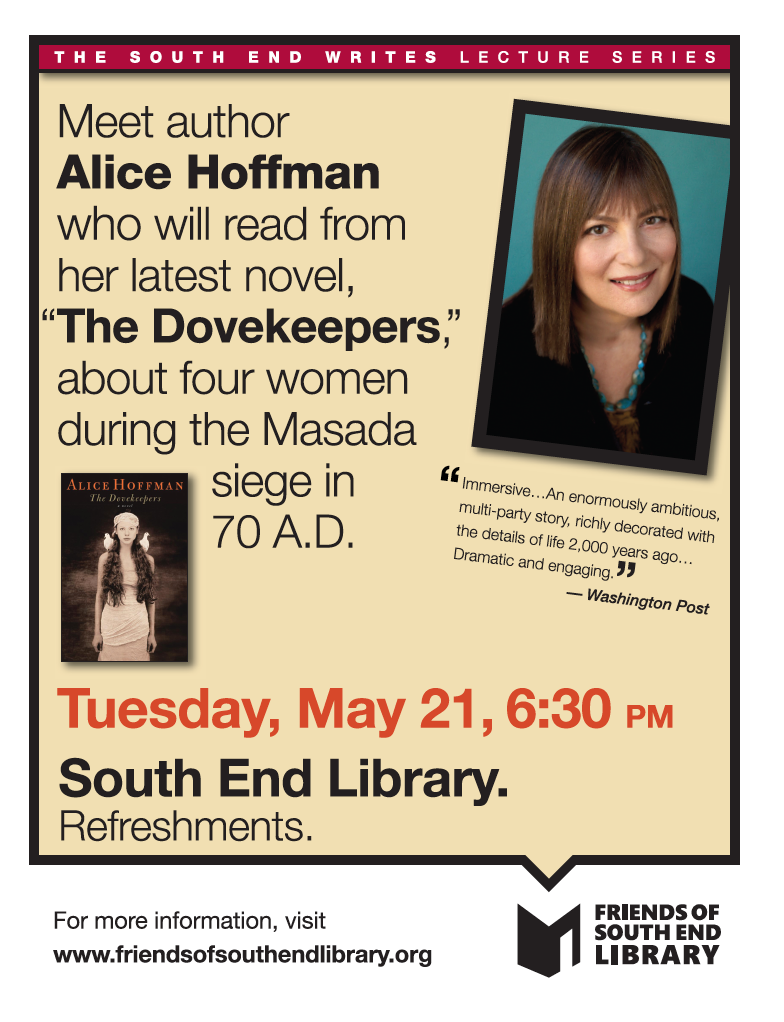South End Writes Speakers Dennis Lehane (5/14) and Alice Hoffman (5/21) Say Having Access to Public Libraries as Children Was Critical to Their Development as Writers
In closely timed appearances at the South End Library this month, two very different but equally successful Boston-based authors singled out community libraries as institutions that gave them the unique chance to find themselves as readers, thinkers and writers."I'm here because of the library," was the unequivocal statement Dennis Lehanemade before a standing-room only crowd in mid-May. "It's like A plus B is C. If you remove B, I wouldn't be here."
Alice Hoffman seconded he motion a week later before another standing-room only crowd at the South End branch when she said, "It gave me a special feeling when I could take out as many books as I wanted from my library in Melbourne on Long Island. That's how I was able to choose other worlds. I was an escapist reader, as I am an escapist writer."
Dennis Lehane choose not to read from his recent novel, Live by Night, but instead talked about what it took to turn himself into a writer. "Ten thousand hours," he said. "That's what it takes to become good." Lehane said he came from a literary family. "They were storytellers," he explained. "We'd visit relatives on weekends, and they'd tell stories. Eight weeks later, they'd tell the same stories, except they'd be different. They had tweaked them." At a local bar where his father would take him for a ginger ale with a straw, storytelling was a blood sport with little tolerance for a slow-moving tale. "Turn the set back on Jimmy," customers would shout when they heard an inauthentic or unfocused account. What would carry the day was the authentic tragedies of the working class he came from, leavened by humor: "I got screwed. But I keyed his car. And I slept with his sister. And told her brother about it." Finally, Lehane said, there was nothing else he could do except make up stories and get people to believe them. "My fear was I’d end up serving beers at Vaughn’s and someone’d say, ‘Hey Hemingway, pour me another Bud.’" Reading urban novels by writers like Richard Price --The Wanderers, Clocker-- changed his life. The characters were a revelation, he said. "I knew those people, what was in their kitchens," Lehane said. "I'd found my subject."
"Many authors talk about themselves but I like to escape from my life," commented Alice Hoffman when describing her writing life a week later. She added she realizes "increasingly how autobiographical my work actually is." By way of explaining both the escape attempt and the discovery her work may be about her life after all, Hoffman took as an example an earlier novel, The Ice Queen. "It's about a girl struck by lightning who survived it. I may have been writing about myself, as a survivor, of cancer. But I removed myself from the circumstances of it,” she said. "Often the writer is the last to know what the book is about.”
The genus of The Dovekeepers was hearing from a guide while visiting her son, an archeologist working in Israel, that there might have been women survivors from the siege in Massada.“That’s when I knew I had a novel,” she said. “These were my themes: love, loss, survival, and women in war who need to protect their children." Visiting Massada in the summer when it was 105 degrees and no one else was there, she found the experience "so mystical, it was as if I could almost hear the women,” she said. A nearby museum with many artifacts from those times further brought the people who lived there to life.“There’s a lack of women’s voices in history,” Hoffman observed: in The Dovekeepers the four female narrators describe their lives at Massada, and the intertwining arts of magic, herbs, medicine, and even witchcraft which, though outlawed, was the territory of women. It took Hoffman five years to write this book. “Had I known how much research I’d needed to do for The Dovekeepers, I never would have done it,” she said. She found a mentor in Richard Elliott Friedman, a biblical scholar at the University of Georgia who happened to be a visiting scholar at Brandeis where Hoffman teaches. “It was a huge gift to have a mentor. It changed my life and my career,” she said. “Whenever I had a question, he’d say, ‘don’t worry, I’ll call my rabbi.’”
Hoffman's next book is a “really little non-fiction book,” she said, which talks about ten things to do when you’re diagnosed with breast cancer. The author helped found the Hoffman Breast Center at Mount Auburn Hospital. The five favorite books of Dennis Lehane and Alice Hoffman can be found under The South End Reads tab.




